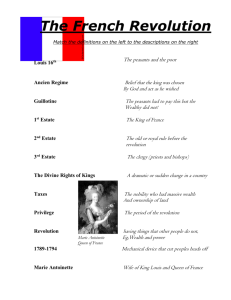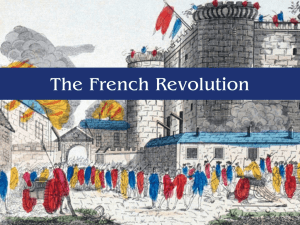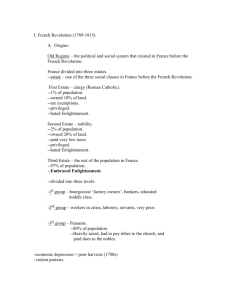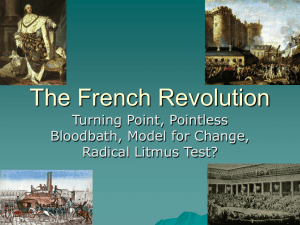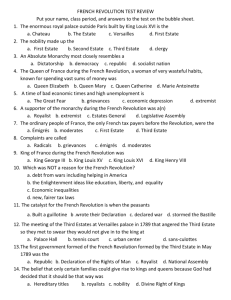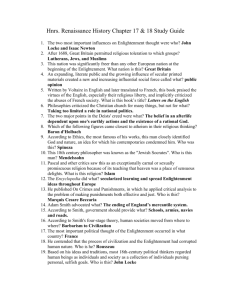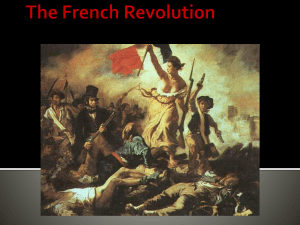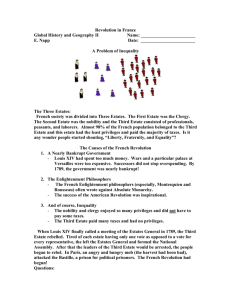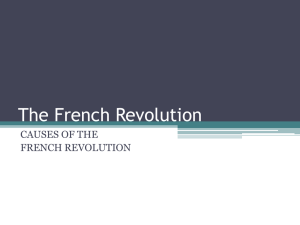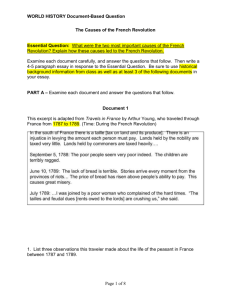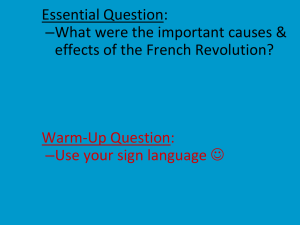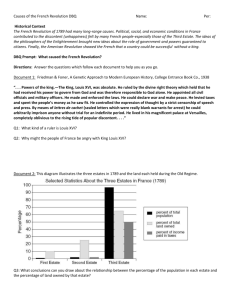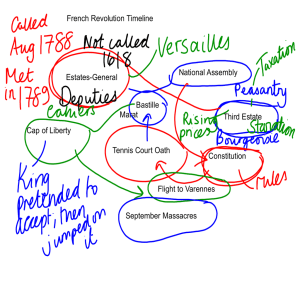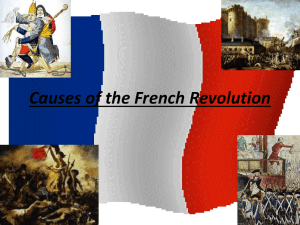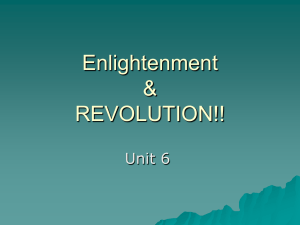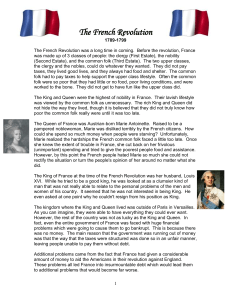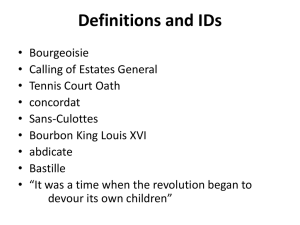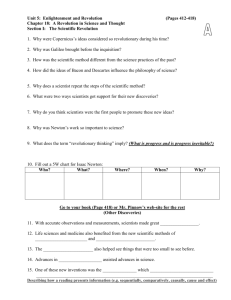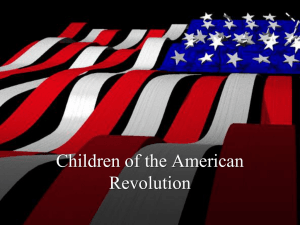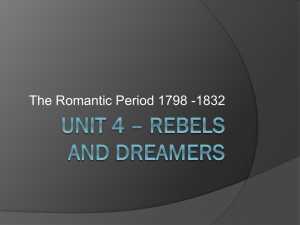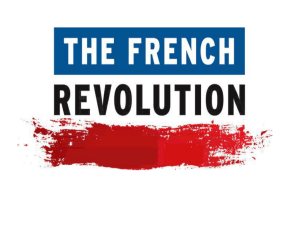FrenchRev Causes
advertisement
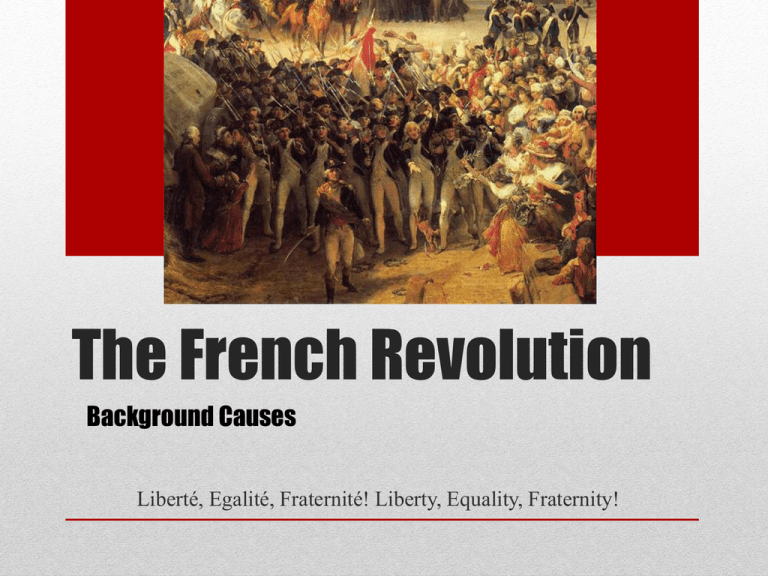
The French Revolution Background Causes Liberté, Egalité, Fraternité! Liberty, Equality, Fraternity! • Many historians view the French Revolution as the most important event in Western History. Why? • France was a leader in Europe – ideas, fashions, codes of behaviour • Beginning of modern age • New ideas on role/ systems of government and citizen rights • Along with Industrial Revolution can be seen as turning point as largely agricultural society transformed into an urban , industrial one A crossroads in History “On Common Sense” Thomas Paine 1776 Document #1 … American Revolution British Americans • Single Empire • Had own representative • Parliament as supreme authority assemblies • Only Parliament could make laws • Did not want King or Parliament for all people, including American to meddle with internal decisions colonists • *Taxation needed representation – did not want taxes issued without consent of the people Concepts of Empire • “Without the pen of the author of ‘Common Sense’, the sword of Washington would have been raised in vain.” – John Adams, Founding Father “On Common Sense” Causes 1775: First battles 1776: Declaration of Independence 1780: Camden, South Carolina 1780 – https://www.youtube.com/watch?v=IFpFHj4XfFg 1781: British army forced to surrender 1783: Treaty of Paris signed – 13 United States A few key dates Were the colonists justified in declaring their independence from Britain? What do you think? • France wanted to support America in its struggle against Great Britain • Sent supplies and soldiers, invested money • Soldiers returned to France with first-hand experience on how a revolution could succeed • American Revolution provided practical example to France • Bill of Rights (1789): many rights came from ideas of 18th C philosophes – European intellectuals saw American Revolution as embodiment of Enlightenment’s political ideals Connections to France? Social Contract Jean Jacques Rousseau 1762 “Man was born free, and he is everywhere in chains” The Sovereign The General Will Document #2 … (you’ve read before) The Enlightenment • Though parts of the Social Contract do not embody Enlightenment ideals, the idea of the Sovereign being the people and voicing the General Will makes us think of reason, moving away from strict monarchies, and questioning the ‘status quo’ – all ideas of the enlightenment What does this contemporary political cartoon say about conditions in France under the Old Regime? Taille, (direct land tax) Impôts, et Corvées (unpaid peasant labour on public projects) Political cartoons during French Revolution. How would these images help spur the revolution? How would an illiterate French citizen interpret these images? What is the Third Estate? Abbe Sieyes 1789 1) What is the third estate? Everything. 2) What has it been in the political order up to the present? Nothing. 3) What does it demand? To become something… Document # 3…? First Estate •Clergy •130,000 •Church owned 10% of land •Exempt from taille (France’s chief tax), but agreed to pay “voluntary” contributions •Divided: higher clergy from aristocratic families (shared interests with nobility), parish priests poor commoners Second Estate •Nobility •350,000 •Owned 25-30% land •Exempt from tailler •Held leading roles in government, law courts, military •Divided: Nobility of the robe (status from office holding – commoners could attain noble rank), and Nobility of the sword (descendants of original medieval monarchy) The Three Estates The Third Estate •Vast majority – 98% of entire population! •Main burdens of taxation on third estate •Differences in occupation, education, wealth •Peasants 75-80% of total population • Owned 35-40% of land • Taxes were crushing: to King, the taille, poll, tithes (produce of land) •Urban working class • Artisans, shopkeepers, other wage earners living in cities/urban areas •Bourgeoisie (middle class) 8% of population (2.3 million people) • Merchants, industrialists, bankers – controlled resources • Professionals: lawyers, doctors, writers, held public offices • Owned 20-25% of land • Wealthy bourgeoisie could enter nobility • Resented not having freedom to criticize unfair system of government The King Must Die! Maximilien Robespierre 1792 “The King must die because the nation must live.” Document #4…? Poor Leadership (Marie Antoinette) Louis XVI • 16th Louis • King of France after death of grandfather (Louis XV) • Largely viewed as indecisive and inconsistent, incapable of proper leadership Marie Antoinette •Austrian (daughter of Maria Theresa) •Married Louis to form alliance between Austria and France •Queen of France: 1774 •Charming and beautiful, but very out of touch with needs of own people •“Madame Deficit” Louis XVI & Marie Antoinette Travels in France Arthur Young 1787, 1788, 1789 First-hand view of peasant life in prerevolutionary France. Document #5 … ? Finances and poverty Tax Crisis: Monarch did not tax effectively Problem 1: Individuals collecting taxes from peasants only gave small amount to government (rest kept for selves) Problem 2: Tax exemptions for First and Second Estates Population increase (due to better medicine, agriculture) = more people to feed Problems France in debt (aiding American Revolutionary War), monarchy living in luxury Drought (1787-88) and severe winter (1789) resulted in crop failures, causing inflation of food (wheat, bread) prices. Led to riots, government was bankrupt and powerless to act. Clip -Enlightenment and American Revolution -- History Channel documentary • 3:29-14:40 In Conclusion…
